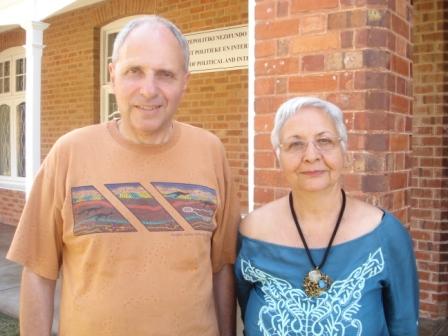
The department of Political and International Studies is hosting two distinguished international academics, Mr John Rose and Dr Elaheh Rostami-Povey as guest lecturers this semester on issues surrounding the Israel Palestine conflict and gender and Islam.
This is their second trip to South Africa. “We visited here last year as part of a guest lecture series, and were invited to come back and teach for a semester. It is a wonderful experience,” said Dr Rostami-Povey, a Mellon Senior Scholar, who is teaching a postgraduate course on gender and Islam.
Mr Rose, a leading member of the Socialist Workers Party in England, said since arriving in the country he has been struck by the level of poverty in Grahamstown, and that he doesn’t see any real justification for it. “It’s almost like there are two Grahamstowns. I have visited Cape Town and gone on a tour of Grahamstown and I ask myself, why are there still shacks around here?”
Mr Rose, author of The Myths of Zionism and who has taught sociology at Southwark College and London Metropolitan University respectively, said while his lecture series is an introduction to the Israel Palestinian conflict, there are numerous parallels to South African history that he is encouraging his students to explore. “In analysing the Middle East conflicts you can see strong correlations to apartheid South Africa. Levels of racism are different in each case but are similar in their severity,” he said.
He said the exploitation of the black majority by the ruling apartheid government echoes the current set up in Israel where Palestinians are being marginalised, but unlike in South Africa where the majority eventually did find the means to resist, “tragically the Palestinians don’t have that level of power and are fragmented as a result of the Zionist movement”.
Mr Rose’s associations with South Africa began in the late 1960s when, as a student at the London School of Economics, he befriended former member of the National Executive Committee and Minister for Intelligence Services Mr Ronnie Kasrils. “We were very good friends and I came out to South Africa in 1970 because of my connection with Ronnie. I made two trips out here working for the ANC.”
Both Mr Rose and Mr Kasrils shared an appreciation for the complexities of certain political movements and were intrigued by understanding Zionism in particular. “It’s amazing how much of a role it played for young Jews growing up after the Second World War. There was belief in the state of Israel as much as there was belief in God. People didn’t even question it. But during my time at university I became aware that there were many questions that needed answering and I’ve made it my lifelong project to tackle them,” said Mr Rose.
Iranian-born academic Dr Rostami-Povey is the author of three books (Iran’s Influence in its Region; Afghan Women and Women, Work and Islamism in Iran). She has taught at the School of Oriental and African Studies, University of London. Dr Rostami-Povey said she believes there are similarities between the ways women in the Middle East experience their gender relations, and how South African women are negotiating certain aspects of theirs.
“Students here and around the world need to know and understand these issues in their complexity. Contrary to the popular image of these societies, Islamist women all share a common goal of struggling against the patriarchal attitudes of men from their own culture, on the one hand, and the patronising Islamophobic attitude of the West on the other,” said Dr Rostami-Povey.
Self proclaimed feminist Dr Rostami-Povey said she believes that while gender equality in the Middle East may be some way off, women are gaining ground in their fight for equality. “For the first time these feminist movements are independent of the state and they are incredibly powerful. They reach across borders and religions, and are uniting women along gender equality lines. In some cases men actually support their women’s’ quests for equality,” she said.
Dr Rostami-Povey said she is hoping for a more nuanced view of the issues surrounding the Middle East, because “things are a lot more complex than people often realise. These women are mobilising and making changes like never before. Let’s not think of them as passive victims, because they are not,” she said.
Photo by Sarah-Jane Bradfield: John Rose and Dr Elaheh Rostami-Povey.
